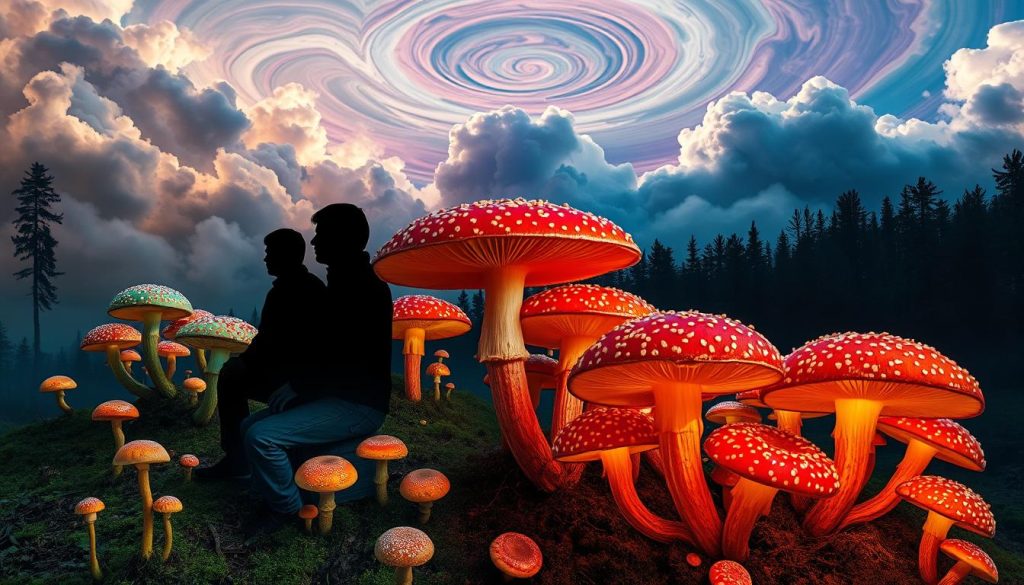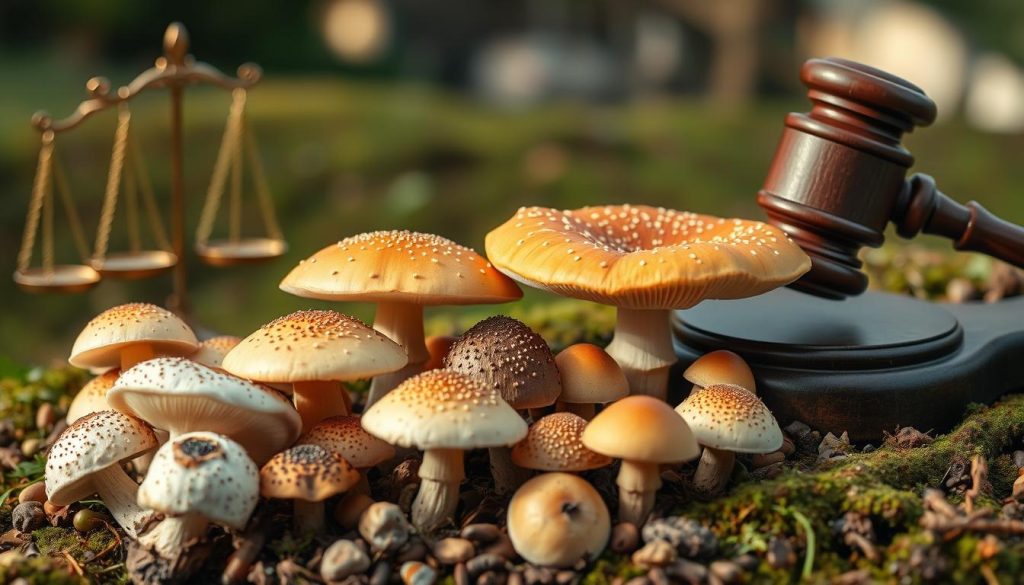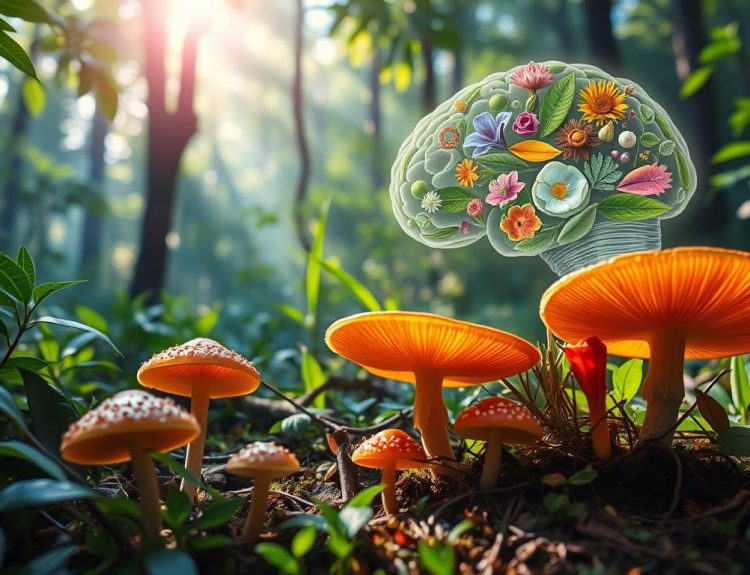Psilocybin, a naturally occurring psychedelic compound found in certain mushrooms, has garnered substantial attention in recent years for its potential therapeutic applications in mental health treatment. The responsible utilization of psilocybin necessitates a comprehensive comprehension of its safety profile and the implementation of necessary precautions to ensure a positive and controlled experience. This article explores the realm of psilocybin safety, examining the potential risks, benefits, and best practices for those contemplating psychedelic therapy with psilocybin.
Key Takeaways
- Psilocybin is a naturally occurring psychedelic compound with potential therapeutic benefits for mental health conditions.
- Responsible use of psilocybin requires understanding potential risks and implementing necessary precautions.
- Setting and environment play a crucial role in ensuring a safe and controlled psilocybin experience.
- Dosage, interactions with medications, and existing medical conditions must be considered when using psilocybin.
- Seeking professional guidance is recommended for those interested in psilocybin-assisted therapy.
What is Psilocybin?
Psilocybin, a naturally occurring psychoactive compound, is found in various species of mushrooms, commonly referred to as “magic mushrooms.” It has a rich history of use in traditional and spiritual practices across diverse cultures.
Introduction to Psilocybin and its Origins
Psilocybin, a tryptamine alkaloid, exhibits structural similarity to the neurotransmitter serotonin. It is believed to exert its psychoactive effects by interacting with the 5-HT2A receptors in the brain. These receptors are pivotal in the regulation of mood, perception, and cognition.
The utilization of psilocybin-containing mushrooms is documented in ancient civilizations, such as those of Mesoamerica. They were integral to religious and shamanic rituals. The first recorded use of psilocybin mushrooms dates back to the 16th century, when Spanish conquistadors encountered their use in indigenous cultures.
In the 1960s, psilocybin and other psychedelics garnered widespread attention. Researchers and the general public explored their potential therapeutic and consciousness-expanding effects. The subsequent criminalization of these substances in many countries did not deter scientific interest in their therapeutic potential.
“Psilocybin and other psychedelic compounds have the potential to unlock new avenues for understanding and treating mental health conditions.”
Today, ongoing research into psilocybin is focused on its potential benefits for conditions such as depression, anxiety, and post-traumatic stress disorder (PTSD). As our scientific understanding of psilocybin evolves, the discussion around its legal status and therapeutic applications remains a critical and dynamic topic.
Psilocybin Therapy and Mental Health
In recent years, the therapeutic potential of psilocybin, the active compound found in certain mushrooms, has garnered significant attention within the mental health domain. Psilocybin-assisted therapy is emerging as a promising approach for the treatment of various psychological conditions, including depression, anxiety, and post-traumatic stress disorder (PTSD).
The rationale behind the use of psilocybin in a clinical setting is rooted in its ability to induce profound changes in perception, cognition, and emotional processing. Researchers believe that psilocybin therapy can help individuals gain new perspectives on their mental health challenges, facilitate introspection, and foster a sense of personal growth and well-being.
One of the key advantages of psilocybin therapy is its potential to address the limitations of traditional pharmaceutical interventions, which often come with unwanted side effects and can be challenging to sustain over the long term. In contrast, psilocybin-assisted therapy aims to provide a transformative experience that can lead to lasting improvements in mental health.
| Condition | Potential Benefits of Psilocybin Therapy |
|---|---|
| Depression | Alleviation of depressive symptoms, enhanced mood, and improved emotional regulation |
| Anxiety | Reduction in anxious thoughts, improved emotional processing, and increased acceptance |
| PTSD | Decreased severity of PTSD symptoms, improved trauma integration, and enhanced resilience |
While the research on psilocybin therapy is still ongoing, the initial findings are promising and have sparked a renewed interest in the therapeutic use of psychedelics in the mental health field. As the understanding of psilocybin’s mechanisms of action and its clinical applications continues to evolve, the potential for psilocybin-assisted therapy to provide a transformative and lasting impact on mental health becomes increasingly compelling.
“Psilocybin therapy has the potential to revolutionize the way we approach mental health treatment, offering a unique and powerful tool to help individuals overcome long-standing psychological challenges.”
Potential Benefits of Psilocybin
Psilocybin, a compound found in certain mushrooms, exhibits considerable promise in the treatment of mental health disorders. Its efficacy in alleviating symptoms of depression and anxiety has been a focal point of research and clinical trials.
Treating Depression and Anxiety
Research indicates that psilocybin-assisted therapy may be an effective treatment for individuals grappling with depression and anxiety. It modulates brain activity in areas crucial for mood regulation, potentially reducing symptoms of depression and anxiety.
A randomized, double-blind, placebo-controlled study demonstrated significant symptom improvement in participants with treatment-resistant depression following psilocybin-assisted therapy. The benefits persisted for several months, indicating potential for long-term relief.
Alleviating PTSD Symptoms
Psilocybin also holds promise for treating post-traumatic stress disorder (PTSD). Researchers are exploring its use in psilocybin-assisted therapy to aid individuals in processing and integrating traumatic experiences, thereby reducing PTSD symptoms.
A study published in the Journal of Psychopharmacology revealed that a single dose of psilocybin, combined with psychotherapy, resulted in substantial and sustained reductions in PTSD symptoms. These findings underscore psilocybin’s potential as a therapeutic intervention for those affected by traumatic events.
| Mental Health Condition | Psilocybin Potential Benefits |
|---|---|
| Depression | Modulation of brain activity in mood-regulating regions, leading to reduced depressive symptoms |
| Anxiety | Improvement in anxiety symptoms through psilocybin-assisted therapy |
| PTSD | Facilitation of trauma processing and integration, resulting in decreased PTSD symptoms |
“Psilocybin-assisted therapy has shown promising results in addressing a range of mental health conditions, including depression, anxiety, and PTSD. The potential benefits of this approach warrant further exploration and clinical investigation.”
Risks and Side Effects of Psilocybin
Psilocybin, a compound found in certain mushrooms, has garnered attention for its therapeutic potential. However, it is imperative to acknowledge the psilocybin risks and psilocybin side effects that accompany its use. The substance can induce a spectrum of physical and psychological reactions, necessitating vigilant monitoring and careful consideration.
The primary psilocybin side effects include an altered state of consciousness. Users may encounter visual hallucinations, distorted perceptions of time and space, and intensified emotional responses. These phenomena can be particularly challenging for individuals with pre-existing mental health conditions or those inexperienced with psychedelics.
- Physical psilocybin side effects encompass nausea, vomiting, headaches, and elevated heart rate and blood pressure.
- Psychological psilocybin risks include anxiety, paranoia, and, in rare instances, the exacerbation of psychotic episodes in susceptible individuals.
- Behavioral alterations, such as impaired judgment and decision-making, can occur during and after psilocybin consumption, posing safety concerns.
The severity and probability of these psilocybin risks and psilocybin side effects are contingent upon various factors. These include the individual’s physiological makeup, mental state, and the environment in which psilocybin is administered. Therefore, it is paramount to have appropriate screening, guidance, and monitoring by qualified healthcare professionals to mitigate potential harms and ensure a safe, beneficial experience.

In conclusion, while psilocybin presents therapeutic potential, it is crucial to approach its use with caution and respect for the inherent risks. By comprehending the possible psilocybin risks and psilocybin side effects, individuals can make informed decisions and take necessary precautions to safeguard their safety and well-being.
Psilocybin Safety: Setting and Environment
The utilization of psilocybin necessitates a profound consideration of the environment and setting. A conducive, controlled, and supportive ambiance is paramount for a psilocybin experience that is both positive and meaningful.
Ensuring a Safe and Controlled Setting
The environment for psilocybin should embody privacy, tranquility, and an absence of distractions. It could be a designated space within a therapist’s office, a home setting imbued with comfort, or a natural environment characterized by serenity. The space must be devoid of hazards, offering ample seating or a suitable area for reclining.
It is imperative that trained professionals, such as therapists or experienced guides, are present to oversee the individual’s well-being during the psilocybin session. These individuals serve as emotional support, offer guidance, and are prepared to intervene in the event of any safety concerns.
| Key Considerations for Psilocybin Setting | Importance |
|---|---|
| Privacy and Comfort | Allows the individual to feel safe and secure, minimizing distractions and external stressors |
| Controlled Environment | Reduces the risk of accidents or adverse events, ensuring a safe and supportive experience |
| Presence of Trained Professionals | Provides emotional support, guidance, and the ability to respond to any safety concerns |
By establishing a safe and controlled environment, individuals can immerse themselves fully in the psilocybin experience. This approach minimizes risks and enhances the potential benefits of this potent substance.
Psilocybin Dosage and Interactions
Establishing the correct psilocybin dosage is paramount for a safe and efficacious experience. The psilocybin content in mushrooms exhibits considerable variability, necessitating a cautious approach. Initiating with a minimal dose and incrementally increasing it as deemed necessary is advisable. Overindulgence in psilocybin can precipitate adverse outcomes, emphasizing the imperative of judicious use and adherence to safety protocols.
Psilocybin’s interaction with various medications and substances can significantly modulate its effects. It is imperative to seek counsel from a healthcare professional prior to psilocybin use, particularly for individuals on prescription medications or those with pre-existing medical conditions.
An exploration of the intricacies surrounding psilocybin dosage and interactions is warranted. The following considerations are pivotal:
- Psilocybin Dosage: The generally recommended dosage spans from 0.25 to 5 milligrams per kilogram of body weight. However, individual responses can be highly variable, necessitating a cautious approach. It is advisable to commence with a low dose and incrementally increase it as deemed necessary.
- Psilocybin Interactions: Psilocybin may interact with specific medications, including antidepressants, antipsychotics, and blood thinners. Such interactions can potentially augment or diminish psilocybin’s effects, thereby increasing the risk of adverse reactions.
- Psilocybin Safety: Adherence to proper dosage and responsible use is critical for maintaining psilocybin safety. The set, setting, and individual medical history can significantly influence the safety and efficacy of psilocybin experiences.
By comprehending the complexities of psilocybin dosage and interactions, individuals can make informed decisions and take necessary precautions to ensure a safe and meaningful psilocybin experience.
| Psilocybin Dosage Range | Potential Effects |
|---|---|
| 0.25-1 mg/kg | Mild psychedelic effects, increased introspection, and altered perceptions |
| 1-2.5 mg/kg | Moderate psychedelic effects, including visual and auditory hallucinations, emotional insights, and profound spiritual experiences |
| 2.5-5 mg/kg | Strong psychedelic effects, including intense visual, auditory, and emotional experiences, potential for challenging or difficult experiences |
“Responsible use of psilocybin requires a thorough understanding of dosage, interactions, and safety considerations. Consulting with a healthcare professional is strongly recommended before embarking on a psilocybin journey.”
Contraindications and Precautions
In the realm of psilocybin’s therapeutic potential, it is imperative to grasp the specific contraindications and precautions entailed. This substance, akin to any potent agent, can interact with certain medical conditions and medications, demanding meticulous consideration and consultation with healthcare professionals.
Existing Medical Conditions and Medications
Individuals with a history of specific medical conditions may encounter heightened risks or contraindications when utilizing psilocybin. These can encompass, but are not limited to:
- Cardiovascular disorders, such as uncontrolled high blood pressure or heart disease
- Psychotic disorders, including schizophrenia and bipolar disorder
- Severe anxiety or depression that is not well-managed
- Seizure disorders or a history of seizures
- Liver or kidney disease
Furthermore, psilocybin may interact with various medications, including:
- Antidepressants, particularly selective serotonin reuptake inhibitors (SSRIs) and monoamine oxidase inhibitors (MAOIs)
- Antipsychotics
- Blood thinners
- Certain pain medications
It is paramount to disclose all current and past medical conditions, as well as any medications being taken, to a healthcare professional before considering psilocybin-assisted therapy. They can offer guidance on the psilocybin contraindications and psilocybin precautions tailored to your individual circumstances, ensuring your safety and well-being.
Thorough evaluation and close monitoring by experienced medical professionals are paramount when navigating the complexities of psilocybin safety. By comprehending the potential risks and adhering to necessary precautions, individuals can safely delve into the therapeutic benefits of this remarkable compound.
Legal Status of Psilocybin
The legal status of psilocybin, the psychoactive compound found in specific mushrooms, is a dynamic and intricate issue within the United States. At the federal level, psilocybin is classified as a Schedule I controlled substance under the Controlled Substances Act. This classification renders it illegal to possess or utilize, with the sole exception of authorized research endeavors.
Notwithstanding, a burgeoning number of states and local jurisdictions have initiated actions to decriminalize or legalize the utilization of psilocybin for medical, therapeutic, or personal reasons. For instance, Oregon became the inaugural state to legalize the therapeutic application of psilocybin in 2020. Concurrently, several cities, such as Denver, Colorado, and Oakland, California, have decriminalized the possession and utilization of psilocybin and other natural psychedelics.
- Psilocybin is currently illegal at the federal level, classified as a Schedule I controlled substance.
- A handful of states and local jurisdictions have taken steps to decriminalize or legalize the use of psilocybin for various purposes.
- The legal status of psilocybin continues to evolve, with ongoing efforts to change laws and regulations around its use.
The legal terrain surrounding psilocybin legality and psilocybin legal status is in a state of perpetual flux. Individuals are urged to remain abreast of the most recent developments in their local and state jurisdictions. As ongoing research elucidates the potential therapeutic advantages of psilocybin, the momentum towards further decriminalization and legalization is anticipated to intensify.

“The legal status of psilocybin is a complex and evolving landscape, with a growing number of states and localities taking steps to decriminalize or legalize its use.”
Preparing for a Psilocybin Experience
Initiating a psilocybin experience necessitates meticulous preparation to guarantee a secure and profound journey. Establishing clear intentions and fostering a positive mindset are paramount. These steps are essential for maximizing the therapeutic benefits while minimizing potential risks associated with psilocybin use.
Setting Intentions and Mindset
Before partaking in psilocybin, it is imperative to reflect on your motivations and desired outcomes. What do you aim to achieve or explore during your psilocybin experience? Are you seeking personal growth, healing, or a deeper understanding of yourself and the world? By articulating your intentions, you can concentrate your mind and embark on a more purposeful and transformative journey.
Moreover, approaching the psilocybin experience with a positive and open mindset is crucial. Engage in activities that promote a sense of grounding, such as meditation, deep breathing, or gentle yoga. These practices can aid in navigating the emotional and psychological depths of the experience.
- Reflect on your intentions and desired outcomes for the psilocybin experience
- Cultivate a positive, open, and receptive mindset through mindfulness practices
- Ensure a safe and comfortable environment to support your psilocybin experience
By dedicating time to thoughtful preparation and setting the stage for your psilocybin experience, you can significantly enhance the likelihood of a profound, insightful, and potentially therapeutic journey.
“The set and setting of the psilocybin experience are crucial factors in determining the nature of the journey.” – Michael Pollan, author of “How to Change Your Mind”
Integrating the Psilocybin Experience
The act of integrating the profound insights and experiences derived from a psilocybin session is paramount for realizing its full potential. This integration process necessitates the deliberate incorporation of the lessons, realizations, and personal growth garnered from the psilocybin journey into one’s everyday existence. It is a critical step towards maximizing the benefits while mitigating the risks associated with this potent psychedelic.
Central to the integration process is self-reflection. Post the psilocybin experience, it is imperative to dedicate time to processing the insights, emotions, and transformations that have occurred. This can be achieved through journaling, meditation, or engaging in conversations with trusted individuals or professionals.
Moreover, implementing practical changes in one’s life is a vital component of the integration process. This may entail the development of new habits, the reevaluation of relationships, or a shift in one’s perspective on personal challenges. The objective is to translate the profound experiences into concrete improvements in one’s mental, emotional, and spiritual well-being.
Additionally, integrating the psilocybin experience may involve seeking the counsel of a therapist or coach who specializes in psychedelic integration. These professionals can offer invaluable guidance and tools to facilitate a deeper understanding and integration of the psilocybin journey.
Through a dedicated and consistent approach to integrating the psilocybin experience, individuals can unlock its full potential for personal growth, healing, and positive transformation. This commitment to integration is a fundamental aspect of psilocybin safety and ensures the long-term benefits of this powerful psychedelic.
Psilocybin Safety: Best Practices
The responsible utilization of psilocybin necessitates adherence to established best practices, aimed at safeguarding individuals and mitigating potential risks. Initiation begins with a rigorous screening process, evaluating an individual’s physical and mental health status, alongside any pre-existing conditions or medications that may interact with psilocybin.
Engagement with trained professionals, such as licensed therapists or medical practitioners, is indispensable. These experts serve as guides, offering support and monitoring throughout the psilocybin experience. They assist in navigating any challenges that may emerge during or post-session.
Implementing harm reduction strategies is of paramount importance. This entails creating a comfortable, controlled environment, ensuring the presence of a trusted guide or sitter, and establishing emergency protocols. Participants must be informed about the effects of psilocybin, how to manage adverse reactions, and the necessity of hydration and avoidance of dangerous activities during the experience.
- Comprehensive screening for physical and mental health
- Guidance from trained professionals
- Establishment of a safe, controlled setting
- Harm reduction strategies and emergency protocols
- Ongoing monitoring and support during and after the psilocybin experience
Adherence to these best practices enables individuals to harness the full potential of psilocybin, while minimizing risks. This approach ensures a safe, responsible, and transformative experience.
“The responsible use of psilocybin requires a comprehensive approach to ensure the safety and well-being of individuals undergoing the experience.”
Seeking Professional Guidance
In the realm of psilocybin utilization, the imperative for consulting with licensed, seasoned mental health professionals cannot be overstated. The intricacies of psilocybin-assisted therapy necessitate a multifaceted approach, ensuring the individual’s safety and well-being throughout the therapeutic journey.
Engagement with a therapist or psychiatrist, versed in psilocybin professional guidance, offers substantial advantages. These specialists are adept at managing the complexities of psilocybin administration, from evaluating a person’s mental health background and readiness, to facilitating the psychedelic experience and aiding in its integration post-session.
- Comprehensive assessment of mental health and overall suitability for psilocybin-assisted therapy
- Guidance in setting appropriate intentions and preparing for the psilocybin experience
- Presence and support during the psilocybin session to ensure psilocybin safety
- Ongoing integration and follow-up care to help process and integrate the insights gained
Engaging with professional guidance is paramount for optimizing the benefits of psilocybin while mitigating potential risks. Collaborating with qualified mental health professionals equips individuals to navigate the complexities of psilocybin use with the requisite care, support, and expertise, thereby fostering a safe and enriching experience.
“The guidance of a trained and experienced professional can make all the difference in ensuring a transformative and safe psilocybin journey.”
Ultimately, prioritizing psilocybin professional guidance is a critical step for those contemplating psilocybin use, whether within a therapeutic framework or for personal development and exploration. This approach empowers individuals to embark on this profound journey with the confidence and support necessary to navigate it safely and effectively.
Ongoing Research and Future Developments
The domain of psilocybin research is witnessing an exponential growth, with scholars and scientists globally delving into its potential therapeutic benefits and safety profile. Recent investigations have illuminated psilocybin’s efficacy in addressing mental health disorders, including depression, anxiety, and PTSD. This advancement underscores the compound’s therapeutic potential.
As the comprehension of psilocybin’s mechanisms of action expands, the scientific fraternity is on the cusp of groundbreaking discoveries. Researchers are probing the long-term implications of psilocybin consumption, the viability of microdosing, and the most effective protocols for psilocybin-assisted therapy. Concurrently, the regulatory environment surrounding psilocybin is undergoing significant transformations, with certain jurisdictions contemplating decriminalization or legalization for medicinal and therapeutic applications.
The horizon for psilocybin’s impact on mental health care is brimming with potential. Clinical trials persist, fostering collaborations between researchers and healthcare professionals, and public awareness of its benefits is escalating. This trajectory heralds an era of promise for psilocybin, poised to transform mental health care globally. As scientists continue to dissect the intricacies of this compound, the scope for enhancing individual and collective well-being expands, inspiring a future replete with possibilities.










